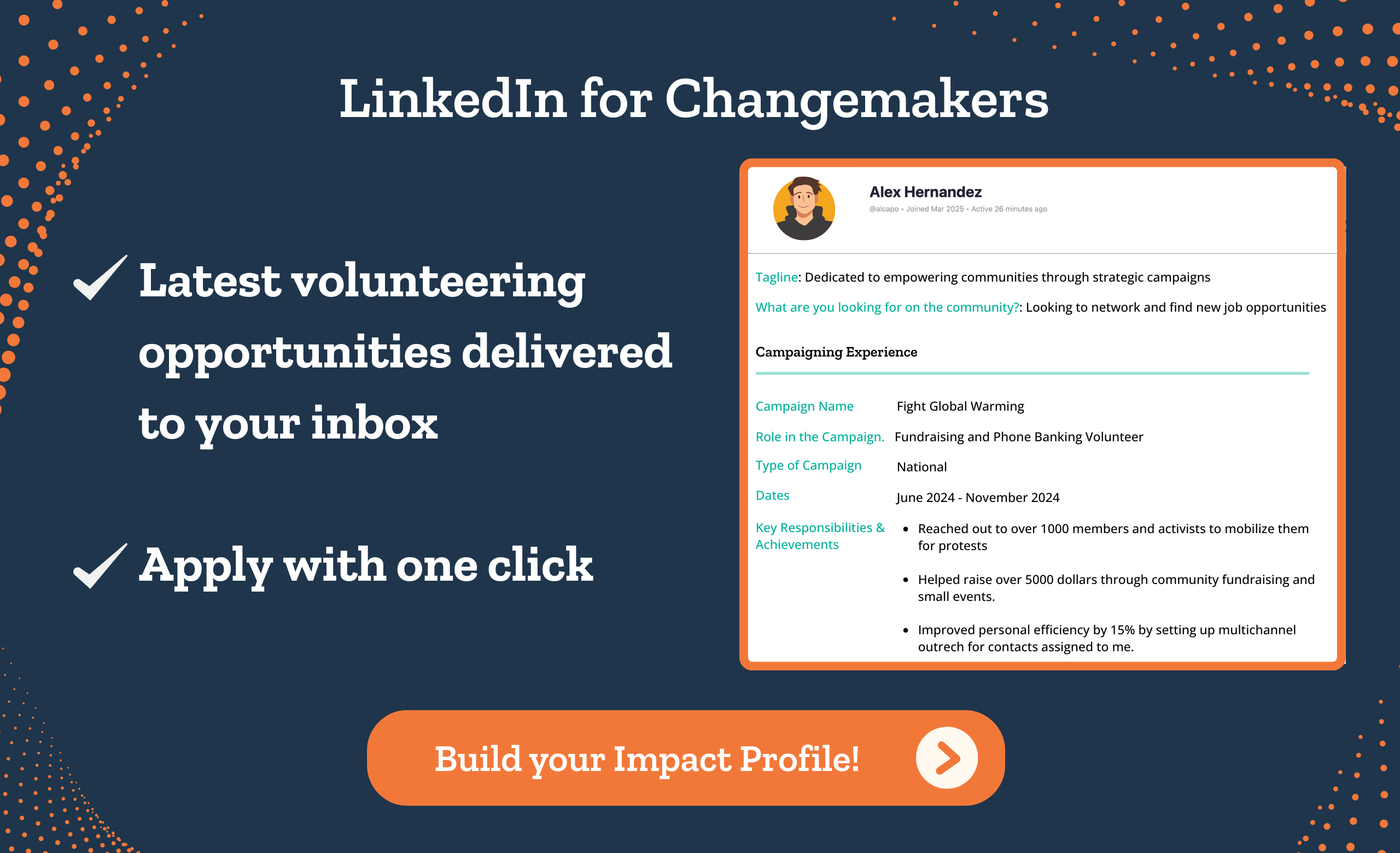Table of Contents
In 2018, Prosper Strategies, a nonprofit consulting firm in the USA, carved a new definition of nonprofit marketing that, in their words, “took the sector by storm.” As unconventional as this definition is, it is an excellent starting point for creating a nonprofit marketing plan template.
“Nonprofit marketing comprises the activities, touchpoints, and messages that motivate stakeholders to take actions that advance a nonprofit’s mission and create sustainable social change.” – Prosper Strategies.
When it comes to nonprofit marketing, the common motives are to raise awareness or raise funds. However, the above definition steers away from narrow goals and aims at a broader action by your stakeholders to contribute to your organization’s mission.
Successful nonprofit campaigns require a solid marketing plan that covers
- An introspective study of your firm: Your market plan should build on your current strengths and chafe away your weak points.
- A strategy to understand supporters’ motivations: What drives your supporters to contribute to your cause? Your nonprofit marketing strategy must utilize those motivations to further your campaign.
- A marketing campaign that fits your overarching mission: Remember, this marketing cycle is but a piece in your nonprofit’s jigsaw. It should stand firm by itself but also contribute to the bigger picture.
In this post, we have a look at how you can devise that plan and have a rewarding marketing cycle.
How do you create a nonprofit marketing plan?
As a staffer on an actively campaigning nonprofit, you may already have too much on your plate. Devising a nonprofit marketing plan then looks like an additional burden.
This may be an additional task. But I promise that it is worth your time and energy since it will ease your next marketing cycle by
- Keeping tasks organized with a clear timeline
- Specifying the goals for your campaign and individual teams
- Tracking progress.
Here’s a 9-step nonprofit marketing plan template for your next quarter or campaign:
- Undertake self-assessment and audits
- Set your nonprofit’s marketing goals
- Study market trends
- Understand your target audience
- Finalize the message you want to communicate
- Create a nonprofit marketing strategy
- Allocate budgets
- Plan your communication channels
- Create an event calendar and bring it all together
Let’s have a look at each individually.
1. Undertake self-assessment and audits
A nonprofit that conducts regular self-assessments can easily identify the gaps in its skill set, fundraising efforts, and previous marketing strategies. Which is why this is step one in our nonprofit marketing plan template. Once identified, you can create an intelligent marketing plan outlining:
- What has worked in the past
- What can work with certain alterations
- What you need to dump
When studying your previous marketing campaigns, include assessments for:
- Donors: List the number of existing donors, the donation brackets they fall in (small/medium/major), and how many can be contacted for future fundraisers.
- Finances- Jot down your marketing budget and expectations from nonprofit grants.
- Human resources- Specify the roles that your staffers and volunteers can undertake. How many from the teams are trained? How many need to undergo training, and for what jobs?
- Technical resources- List existing computers, phones, software subscriptions, and online tools that can be used for the next marketing cycle.
- Strategies- Detail previously used techniques that were successful, mildly successful, and those that failed. Each holds value for what you can replicate and what should not be done.
Here is a marketing plan template for your nonprofit that staffers can complete as part of their self-assessment. Mark each field with appropriate details.
The first column is filled for you as an example.
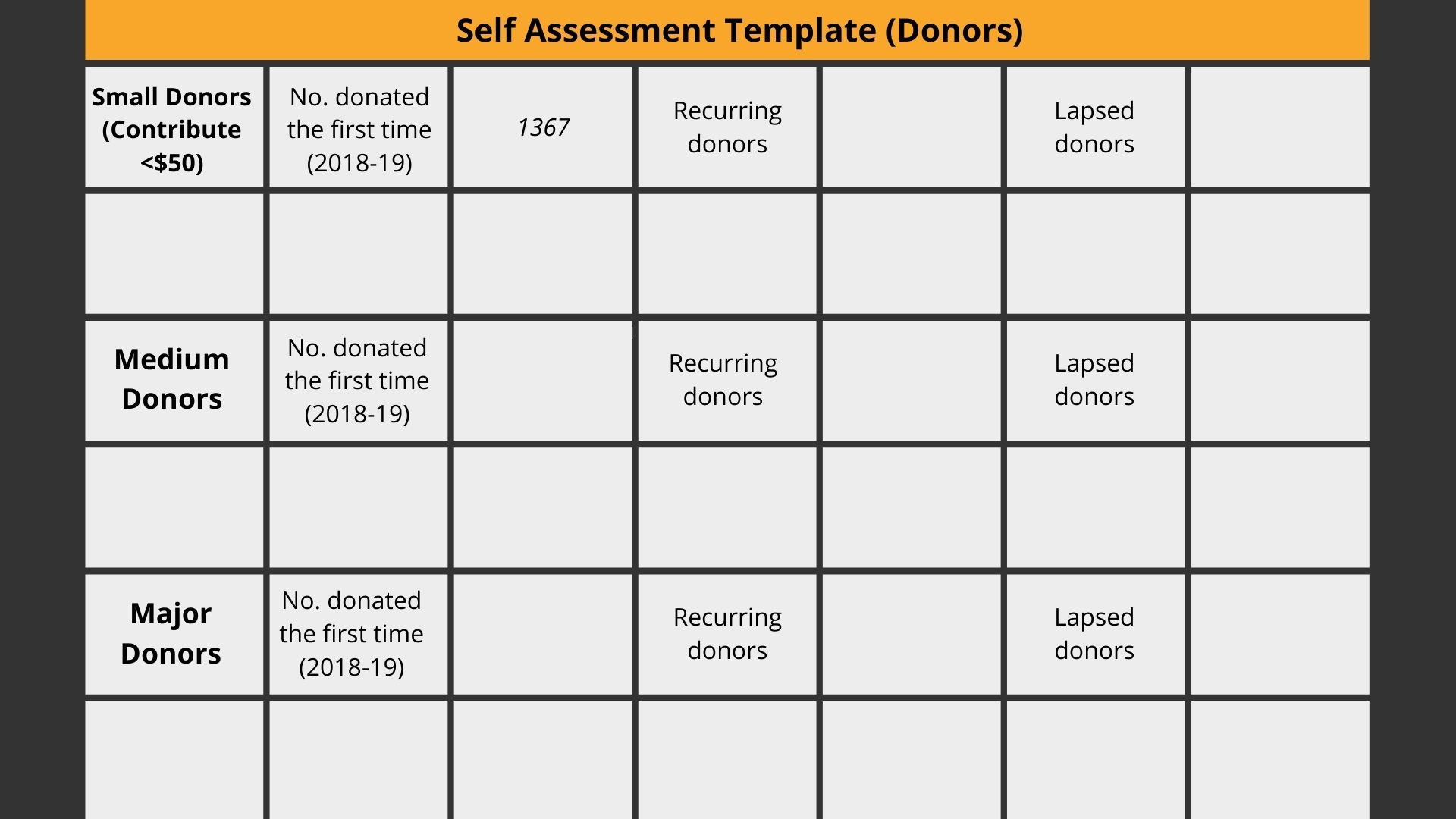
2. Set your nonprofit’s marketing goals
Julia Campbell, a nonprofit digital marketer, mentions how a small organization she worked with advertised its goals but still failed to achieve them.
“As I quickly discovered, the problem was that they were trying to accomplish multiple goals — increase donations, boost community engagement, raise awareness, etc. — all at once,” she writes for Wild Apricot.
This is a crucial lesson in defining your goals for a nonprofit marketing plan. Be ambitious, but do not aim for the impossible.
Pick from the common marketing goals for a nonprofit like:
- Raising funds (Eg: Increasing donations by 20% compared to last year)
- Increasing donor base (Eg, Building a base of 1000 new small donors)
- Raising awareness (Eg: Increasing social media engagement by 30%)
- Recruiting volunteers for the new internship program (Eg: Getting 50 individuals to sign up)
Of course, if you have a bigger team and more resources at your disposal, you can choose multiple goals. But ensure you utilize the lessons from your self-assessment before finalizing these objectives in your nonprofit marketing plan template.
The following sample template looks at a fundraising goal for a nonprofit. Staffers can use or replicate it to suit other goals set for the upcoming cycle.
| Nonprofit marketing plan template for goals and objectives: | |||||
| Funds to be Raised | Deadline | Person(s) in charge | |||
| Major donors to contact | Start & End Date | Methods of communication | |||
| No. of new leads to contact | Start & End Date | Methods of communication | |||
| Major Sponsorships | Total amount to secure | Person(s) in charge |
3. Study market trends in your nonprofit marketing plan template
Here are some marketing statistics for nonprofits to ponder over:
| 2018 | 2019 |
| Online revenue for nonprofits grew by 1% | Online revenue grew by 10% |
| Email fundraising response rates fell by 13% | Email fundraising response rates grew by 1% |
| Mobile lists (people who gave consent to nonprofits for texts) grew by 14% | Text messaging audience for nonprofits grew by 26% |
| Digital ad budgets grew by an astonishing 144%! | Nonprofits increased their digital ad budgets by a further 17% this year. |
Data for 2018: MR Benchmarks. Data for 2019: MR Benchmarks
It is evident that nonprofit marketing trends change periodically, so it becomes crucial for any marketer to study relevant trends for every cycle.
You can be the best judge of what trends to look out for. Here is one marketing plan template for your nonprofit that you can base your studies on:
| Giving Trends | ||||
| Online Giving | Key Insights | Channels | – Facebook – Online Donation Tools – YouTube – Fundraising Page | |
| Text Messages | Key Insights | Channels | – Text to give – Peer-to-peer texting – Mass Texting | |
| Email Marketing | Key Insights | |||
| Event Marketing | Key Insights | Events planned |
4. Understand your target audience: nonprofit marketing plan template
A marketing persona is a semi-fictional representation of your ideal donor, volunteer, or supporter. These personas are based on your existing supporters and define their most appealing characteristics that suit your campaign.
Nonprofit marketing persona sample:
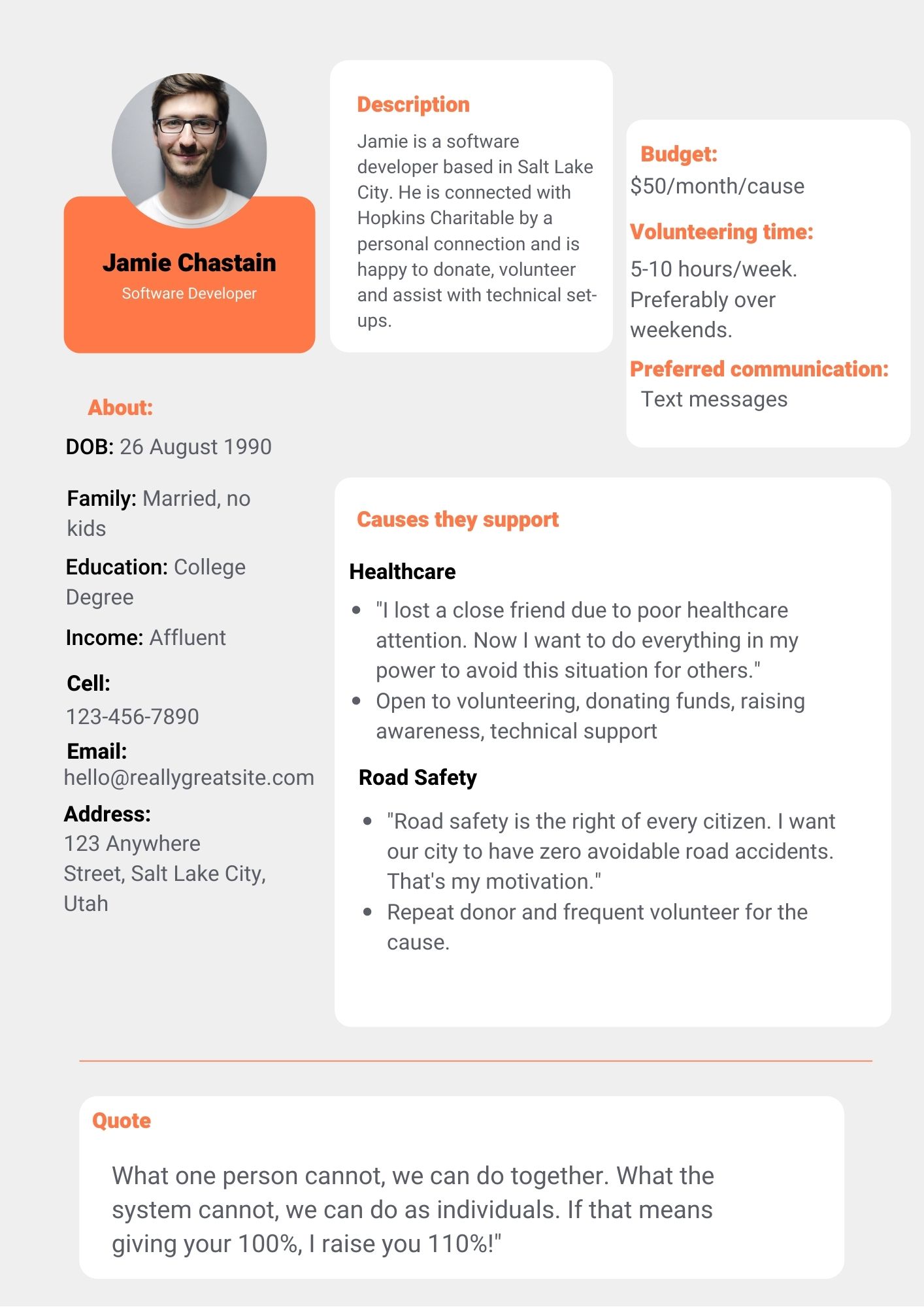
When drawing such personas for your nonprofit marketing campaign, remember its two crucial elements:
- Be inexhaustive: These personas or their characteristics should not be too detailed. Intricate details narrow your scope. They should be based on several of your supporters– drawing commonalities between them.
- Define key segments of donors: Divide your audience into small, medium, and major donors or first-time, repeat, and lapsed donors. Draw various personas under each different segment to ensure your view is not limited to a singular characteristic. (For instance, your ideal donor may be a working professional, a businessperson, and others with charitable income. Drawing different personas for each can keep the list inclusive but not too vague).
Such personas will help you understand your supporters’ priorities and enable you to target the right audience.
Here is a template for your personas to market your nonprofit.
Nonprofit marketing plan template for target personas.
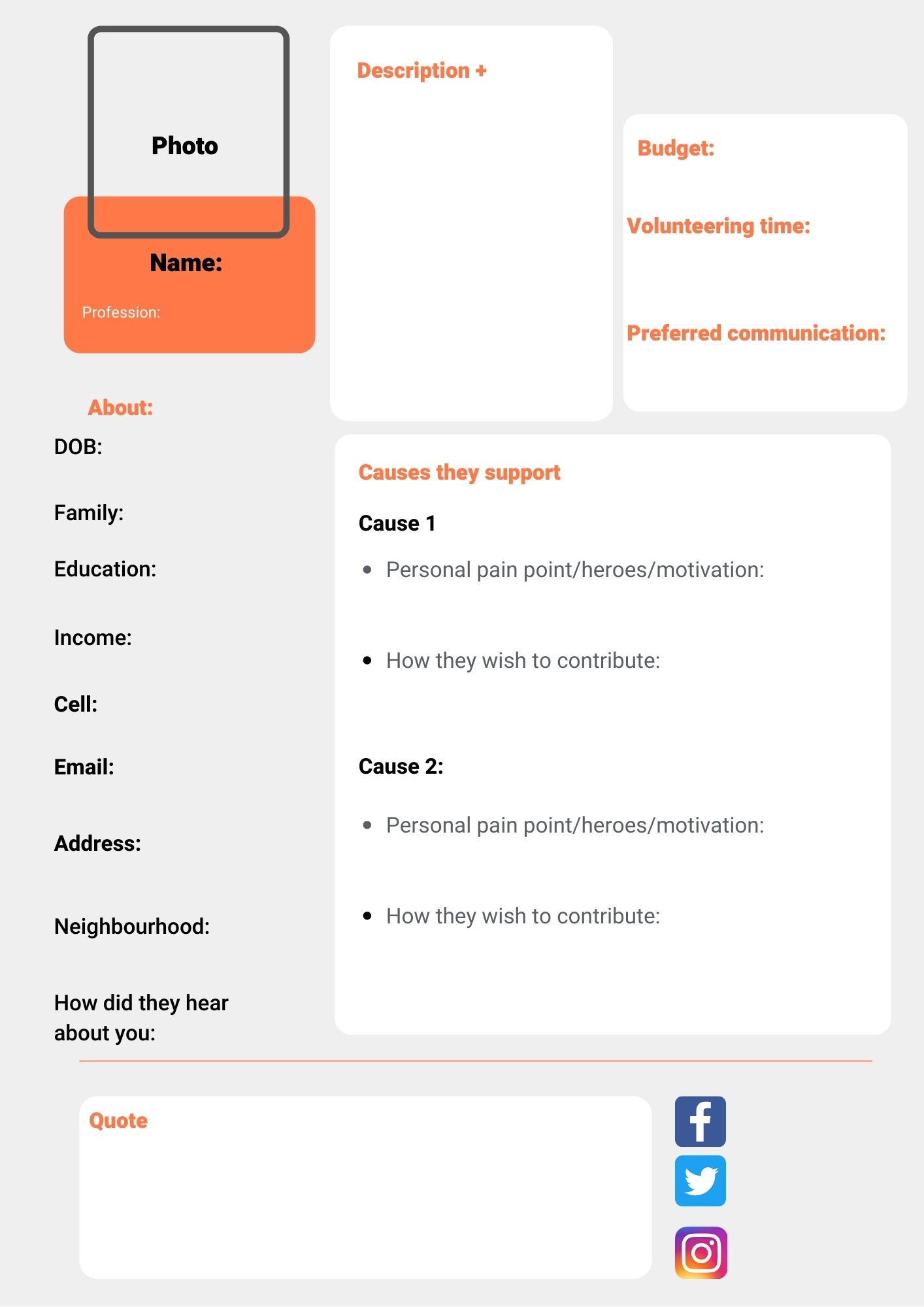
5. Finalize the message you want to communicate
- How is your product, service, or appeal unique from the others?
- What is the message you want to communicate with donors?
This is the crux of your marketing plan. All your telephone fundraising scripts, text message scripts, and social media posts will zero down on this message.
While this forms your marketing message base, the final product must be “me marketing” rather than “you marketing.” This table will help you understand the difference:
| You Marketing | Me Marketing |
| Talks only about the organization | Speaks about your potential supporter’s role in your cause |
| The main brand is your nonprofit | The hero is your cause, and the message is how you and your supporters can contribute to it |
| Involves – your missions – your awards – your staff members – your impact | May include details of the organization but more focus on – how a person can help – the impact they will create -the avenues they can adopt to support you |
| E.g., “We helped 100+ Arizona homeless families get shelter through winter last year. Our staff involves people from diverse backgrounds, and we believe in “all for one.” Come join us to create such a massive impact every year!” | E.g., “Are you passionate about helping the disadvantaged? Our team is looking for enthusiastic volunteers like you to help homeless Arizonians this winter. Text JOIN to 33339 to be a part of our team.” |
Remember the CRAM rule to adopt a “Me Marketing” strategy in your nonprofit marketing plan template:
- Connecting: Connect your cause to something your audience cares about.
- Rewarding: Make the experience rewarding and satisfying.
- Actionable: Your marketing message must have a good call to action.
- Memorable: The experience with you must be sentimental or have tangible rewards to make it memorable.
| A compelling nonprofit marketing message includes story-telling. It speaks about your impact and the contributions that supporters can do to further that impact. While crafting the perfect message, write stories that will wow your audience. Fill the following sample template with your stories to brand your desired message. |
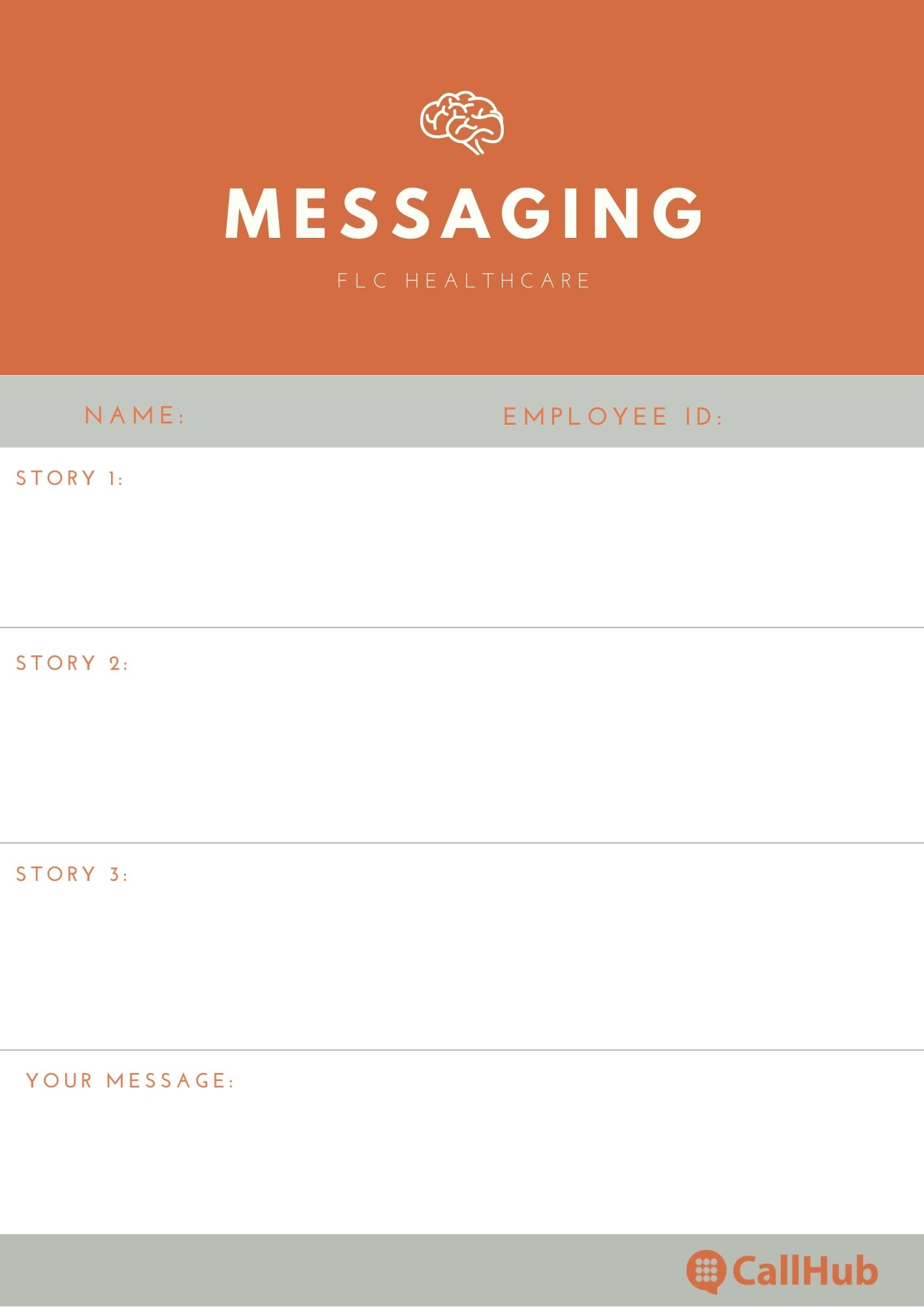
6. Create a nonprofit marketing strategy
Take a look at this research about nonprofit marketing strategies conducted in 2018.
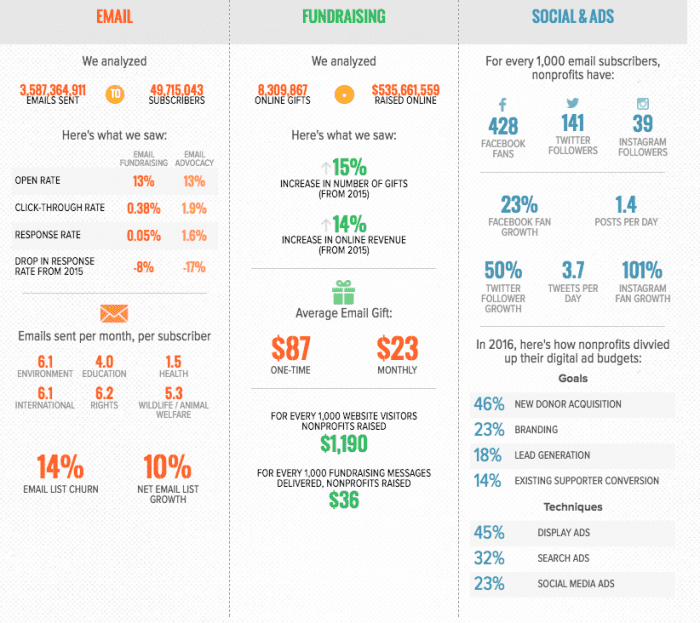
The nonprofits that responded engaged in several strategies that enabled them to see impact in various ways.
- By spreading awareness via emails, the nonprofits increased their net email list (even with a 14% list churn)
- An average of $36 was raised for every 1000 fundraising text messages.
- Social media updates enabled a 23% follower growth on Facebook and 50% on Twitter.
With this success, the organizations could design goals for the following round of digital marketing.
A nonprofit marketing strategy is exactly that- to have a set of goals and devise ways to achieve them.
| For instance, say you raised $1000 last time and this time want to raise $1500 only from old donors. Your marketing strategy can be to engage in telefundraising and text message fundraising and make donation appeals to existing supporters. |
This is where your self-assessment holds the most importance. Once you understand what strategies have worked for you in the past, you can:
- Finalize the online strategy that you will continue this year
- Schedule events where you got satisfactory attendance
- Go for paid social media promotions that have increased engagement rates
- Utilize communication channels where you get satisfactory response rates
- Learn from your past strengths and experiment with new marketing strategies.
A good marketing plan accommodates multiple strategies to target a variety of audiences. You have studied current market trends and analyzed the best ones for you. Now is the time to utilize this research and your self-assessments to finalize strategies.
| An essential part of nonprofit marketing is advertising it the right way. To know how to promote your brand seamlessly, read Everything You Need to Craft a Successful Nonprofit Advertising Strategy |
7. Allocate Budgets in the nonprofit marketing plan template
Nearly 20% of nonprofits have no fixed budgets for marketing! If you are among those, drop everything! This takes priority in your nonprofit marketing plan template.
And even if you have a budget ready, make sure you reserve enough funds for marketing.
It is advised that 5-15% of your operating budget should be reserved for marketing.
This provides a good starting point to determine how much funds you are holding for this marketing cycle. When you have that number, divide the budget and dedicate it to your marketing strategies. Here’s a template for you to follow (We have filled two columns as samples for the marketing budget):
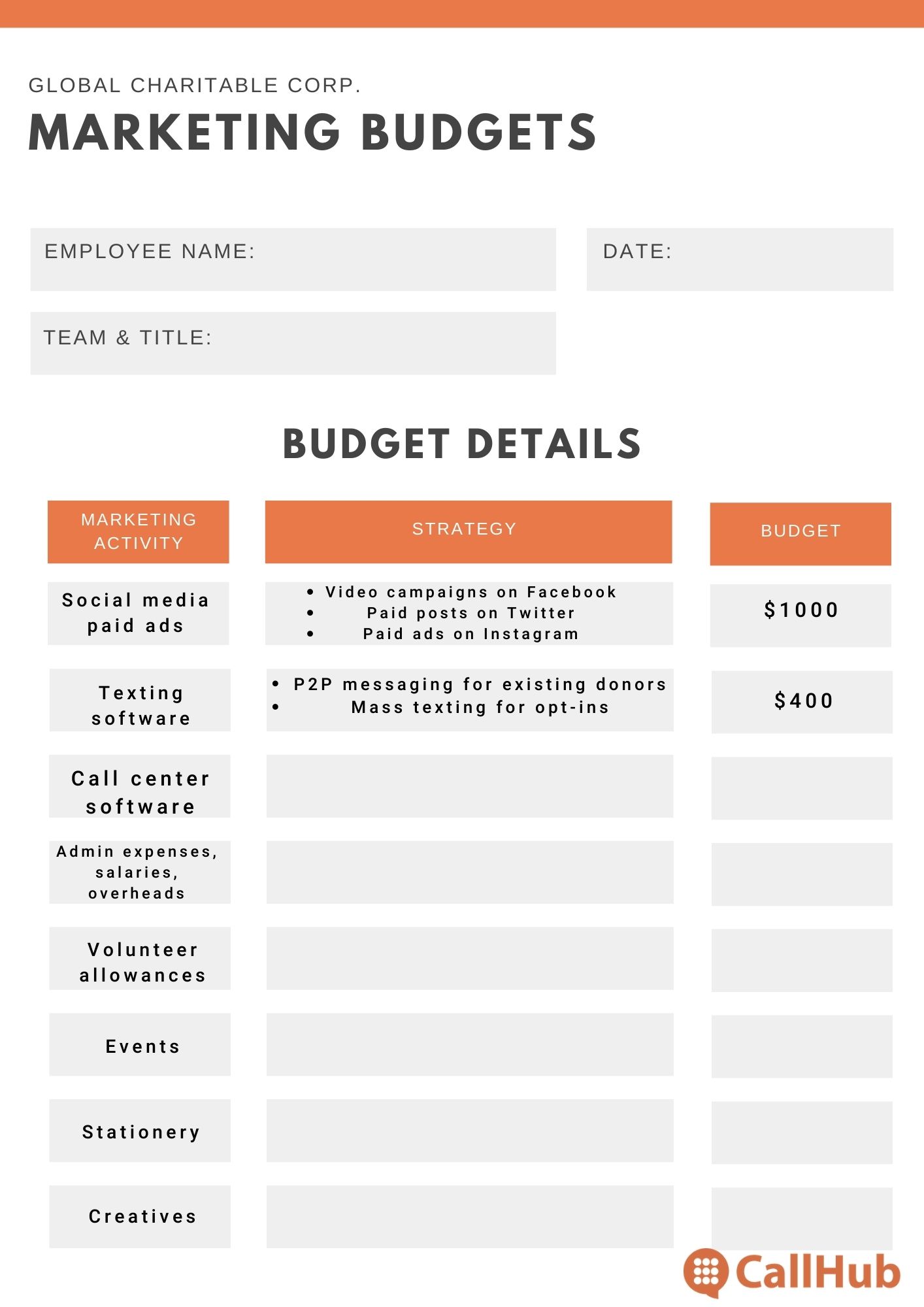
| Marketing Activity | Strategy | Budget |
| Social media paid ads | Video campaigns on Facebook posts on Twitter ads on Instagram | $1000 |
| Text messaging software | P2P messaging for existing donorsMass texting for opt-ins | $400 |
| Call center software | ||
| Admin expenses, salaries, overheads | ||
| Volunteer allowances | ||
| Events- venue, food and beverages, decoration | ||
| Stationery | ||
| Creatives | ||
| Miscellaneous expenses | ||
| Total |
8. Plan your communication channels in the nonprofit marketing plan template
“Content is King, but engagement is Queen, and the lady rules the house!” – Mari Smith
No marketing plan is complete without a comprehensive communication strategy. You have a unique message for your brand, a solid goal to reach and an effective communication plan is how you take the former to the latter.
Make sure to utilize popular communication channels for effective outreach.
| Communication channels | Benefits |
| Peer-to-peer texting (P2P texting) | – Texts have a 98% open rate and a 45% response rate. P2P texting helps you maintain and grow relationships with your supporters with one-on-one communications. – Personalized communication with existing supporters offers the opportunity to make big asks. – E.g., “Hi Maurin, this is Tanvi from PlantOne. Your donation last year helped us reforest Lake Chin. This year, we plan to beautify Lake Sirius. Can I count you in for a $50-100 donation?” |
| Text Blasts | – Calls offer a personal touch to your outreach, invitations, or fundraising efforts. They show you care and help maintain your relationship with supporters. – Enables you to explain your cause in detail, opening the window to making specific or big asks. – Ideal for appeals to major and small donors, thank-you calls, event invites, and donor recognition. – Automated dialers save time. They can make 3-5X more calls than manual dialers, thus helping you reach out to more people in a definite time. |
| Phone calls | – Ideal for small and major donors who have signed up for your mailing lists. – Emails can have lengthy text and enable you to send relevant fundraising, sign-up, and other links. – They let you make big or specific asks. – Spam rates for nonprofits are 0%, and unsubscribe rates are 0.17% |
| Emails and Newsletters | – Over 27% of people discover nonprofits through online research – Initiate group conversations on Facebook pages, post videos on YouTube, and start online fundraisers for your nonprofit. – Paid promotions enable you to target the right audience across geographies. |
| Social Media | “The best kind of marketing does not feel like marketing.” When your staffers, volunteers, and beneficiaries talk about your work in their social circle, they share personal stories and give you a unique edge. – This also includes increasing in-house social media presence and asking your staffers to promote your posts on their handles. – Personal connections increase your chances of success since people trust their friends and family more than organizations. |
| Word of Mouth | Word of mouth is the easiest way to build trust with others. People are most likely to believe other people who have tried and tested your organization. |
9. Create an event calendar and bring it all together in your nonprofit marketing plan template
The last bit of your nonprofit marketing plan is to put everything in place. At this stage, you have your strategies and communication channels ready. Your team is also trained and prepared. This may feel like it’s all over the place, but we have one more step to go- bringing all your efforts together in a single place.
This includes creating a timeline for your marketing cycle and detailing
- The start and end dates of all events
- Communication campaigns
- Teams, leaders, and their goals
- Budget allocations
- Volunteer and staff training
- Regular meetings with the staff
- Content calendar
Once you have all of this in place, communicate the details with your team, and your nonprofit marketing plan is done!
An organized blueprint for your nonprofit marketing can streamline efforts for small and large teams. It ensures that your efforts are not scattered stars but an elegant constellation. We hope our nonprofit marketing plan template further eases your efforts.
Now it is only a matter of ready, set, go!
Read Next: How to Effectively Plan a Nonprofit Communications Calendar (Template Included!)
Feature image source: Estée Janssens/ Unsplash

